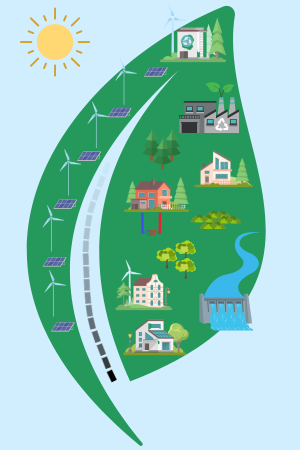
HYDRO POWER
Making waves, saving energy
ENERGY RISES
Harnessing the power of flowing water has been a practice since ancient civilisations utilised water wheels for grinding grain.
Today, we use this energy source in a much more sophisticated manner, with hydroelectric power stations supplying electricity to entire cities.
Can this large-scale renewable energy be scaled down for use at home? Absolutely. Let's delve into the world of home hydroelectric power systems.
WATER POWERED
Hydroelectricity involves capturing the energy from flowing or falling water and converting it into electricity.
In a home setting, this usually involves setting up a small hydroelectric generator in a nearby stream or river. The water's kinetic energy turns a turbine, which spins a generator that produces electricity.
One significant advantage of a home hydroelectric power system is its ability to provide continuous power.
Unlike solar and wind power, which are dependent on daylight hours or weather conditions, a well-placed hydroelectric system can produce electricity 24/7, given a consistent water source.
The cost-saving potential of home hydroelectric systems is another compelling reason for its adoption. Although the upfront installation costs can be significant, over time, the system often pays for itself in the form of reduced or even eliminated electricity bills. In some cases, homeowners can also sell excess power back to the grid, further offsetting the initial setup costs.
Environmentally, hydroelectricity is a winner. It's a clean, renewable source of energy that doesn't produce greenhouse gases or other harmful pollutants. By choosing hydroelectric power, homeowners can significantly decrease their carbon footprint and contribute to a greener planet.
However, hydroelectricity isn't a feasible solution for everyone. One obvious requirement is a flowing water source on your property. The site also needs to have sufficient head (vertical drop) and flow to generate a meaningful amount of power.
In addition, there are potential ecological impacts, such as altering water flow and disrupting local aquatic ecosystems, which need to be carefully managed. It's also important to navigate the legal and regulatory framework around water rights and environmental impacts in your region before embarking on a home hydroelectric project.
In terms of maintenance, while hydro systems are generally robust, they require regular check-ups to clear debris and ensure optimal function. In colder regions, the freezing of water sources can also be a potential issue.
Given these factors, the key to a successful home hydroelectric system lies in careful planning and consultation with experts in the field. Despite the challenges, for those with a suitable water source, installing a small-scale hydroelectric system can be a rewarding investment.
In conclusion, hydroelectricity for the home offers a reliable, efficient, and environmentally friendly power source. As we move towards a more sustainable future, adopting renewable energy solutions at the individual level is a significant step forward. Home-based hydroelectric power is one such solution, blending age-old wisdom with modern technology to empower homeowners towards energy independence and a reduced environmental impact.
Hydro power process
Assessment
Given the complexity of hydropower, a professional assessment of your site is crucial. We can evaluate the head, flow rate, and potential power output.
Our assessor will also help determine the best location for components like the intake, pipeline, and generator.
Installation
This task involves civil engineering, electrical work, and potentially complex mechanical setup — it's not a DIY project.
Our installer will construct the intake, lay the penstock, install the turbine and generator, and set up the electrical connections.
Inspection
Once the system is installed, it will need to be inspected for regulatory compliance and operational safety.
Our installation team will thoroughly test the system in different conditions to ensure it's operating correctly and efficiently.

